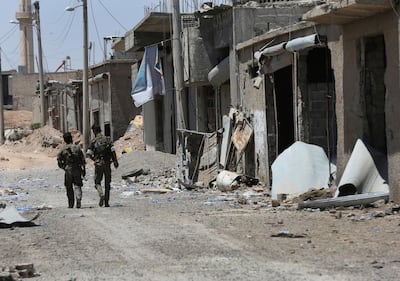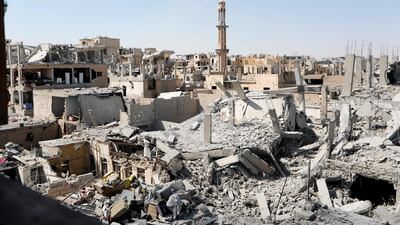Claims by the US-backed Syrian Democratic Forces militia that it had fully captured the Old City of Raqqa from ISIL were questioned by groups monitoring the Syrian conflict on Saturday.
The SDF said on Friday they had taken full control of the Old City and that 65 per cent of Raqqa - the self-declared capital of the extremist group - was held by the rebel alliance.
But the US military, which provides extensive assistance to the SDF, could not confirm if the Old City had fallen completely.
“The SDF are making great progress around the city centre and throughout Raqqa and gain more ground every day,” said Col Ryan Dillon, the spokesman for US-led coalition fighting ISIL in Iraq and Syria. “The SDF are the best source for operational updates on their progress in the fight to defeat ISIS in Raqqa.”
An SDF spokesman could not immediately be reached for comment on Saturday.
The Syrian Observatory for Human Rights, which monitors the conflict, said on Saturday that clashes continued in the Old City, centred around the Bosaria neighbourhood. It also reported ongoing fighting across the city.
Col Dillon said the US continued to monitor a convoy of buses carrying ISIL fighters and their families that had been attempting to travel to the ISIL-held city of Albu Kamal on the Iraqi-Syrian border.
The convoy of about 600 people has been stuck near the Syrian city of Al Sukhna since Wednesday after the US military said that it would not allow the fighters to reach Albu Kamal and carried out strikes on roads the convoy intended to take, as well as against ISIL fighters nearby.
"The convoy has not met up with ISIL elements in eastern Syria," Col Dillon said. "We will continue to strike ISIL vehicles and fighters who attempt to unite with their fellow terrorists and will continue to disrupt the ISIL convoy from moving east."
_________________
Read more:
You don't beat ISIL by dumping them somewhere else, US tells Syria and Russia
Iraqi PM condemns free passage deal for ISIL fighters
Lebanon army declares pause in offensive against ISIL
_________________
The transfer of the ISIL fighters and their families had been part of a deal to end the presence of the extremists on the Lebanese-Syrian border. ISIL militants there surrendered to Hizbollah and the Syrian military late last month in exchange for bodies of Hizbollah fighters held by ISIL and safe passage to Albu Kamal.
The Observatory reported on Saturday that about a dozen private cars had assisted some ISIL members in leaving the convoy and that they had pursued other routes to Deir Ezzor, including passage through Iraq.
"We have not seen that," the US military told The National. "There have been private vehicles that have arrived to the convoy to provide water and food, but we have not seen any members of the convoy who have departed with these vehicles."
The Observatory could not confirm whether people who left the convoy were fighters or civilians.

Elsewhere in Syria, the government - with support from Russian helicopters and Hizbollah fighters - said it was pushing ISIL fighters from their last remaining strongholds in central Syria, near the city of Hama.
The Observatory reported that the government had captured the village of Uqairabat on Friday, a victory that would help secure the country’s main highway between the cities of Homs and Aleppo and further consolidate areas under government control.
It also catalogued 2,707 deaths in Syria in August, 790 of them civilians, and said that of those civilian deaths, 398 were caused by shelling and air strikes by the US-led coalition.
Monitoring groups have raised concerns about civilian deaths in recent months as the fight for Raqqa intensified.
The US-based monitoring group Airwars said last week that “1,700 or more civilians have likely been killed by US-led air and artillery strikes in Raqqa governorate since March”.
“A minimum of 860 civilians, including 150 children, are credibly reported to have been killed in Raqqa since the official start of operations to capture the city on June 6,” it said.
The Observatory puts the total number of dead in the six-year-old conflict at more than 470,000.
Nonetheless, the UN’s special envoy to Syria Steffan de Mistura suggested on Friday that elections could be held in Syria within a year.
“The Syrian government and the Russians are very likely between now and the end of this month or perhaps early October, latest, to actually liberate it [Deir Ezzor]," Mr de Mistura told BBC radio, adding that the US and the SDF "will probably liberate Raqqa by the end of October".
“After Raqqa and Deir Ezzor, and that is a matter of a few months, there will be a moment of truth,” he said. “If the international community will be helping both the opposition and the government by pushing the government to accept a real negotiation, then within a year it would be a possibility of having a truly credible election.”
The third area, Idlib, is "full of Al Nusra”, Mr de Mistura said, referring to the Nusra Front, a one-time Al Qaeda affiliate now called Fatah Tahrir Al Sham.
Even as the government of Syrian president Bashar Al Assad gains militarily with direct backing from Iran and Russia, it appears unlikely that Syrians would want him to remain in power.
“We don’t accept that Al Assad could be president, even in a transitional period,” said a Syrian anti-government activist near the city of Homs who asked to remain anonymous. “There should be war crimes tribunals.”
A Syrian journalist from Aleppo, Najm Khaled Shahba, said any elections would have to include Syrians living both in and outside the country, and be monitored by the UN. He also pointed out that elections had been one of the initial demands of the demonstrations against the government that preceded the outbreak of war six years ago.
“We asked for a democratic country where there is justice for all people, but the regime targeted us by warplanes,” Shahba said. “There are people inside regime area who are against it and UN should protect them if they say no for Assad's regime.”
* Additional reporting by Reuters

